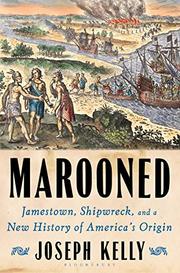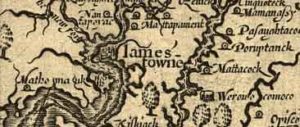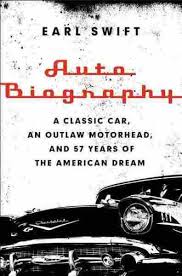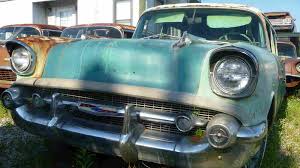Joseph Kelly: Marooned: Jamestown, Shipwreck, and a New History of America’s Origin
March 18, 2019 by David
Filed under Non-Fiction, WritersCast
 Marooned: Jamestown, Shipwreck, and a New History of America’s Origin – Jospeh Kelly – 978-1-63286-777-3 – Bloomsbury – Hardcover – 512 pages – $32 – October 30, 2018 – ebook versions available at lower prices
Marooned: Jamestown, Shipwreck, and a New History of America’s Origin – Jospeh Kelly – 978-1-63286-777-3 – Bloomsbury – Hardcover – 512 pages – $32 – October 30, 2018 – ebook versions available at lower prices
I really enjoy reading books about American history, and especially lately, books that explore some of the stories and moments that are foundational to the history of this continent, but are not well known or well told. And I’ve also become extremely concerned about gaining a better and more nuanced understanding of those stories that have been told solely from the perspective of the European (white) perspective that dominates our historical narrative, and thus our understanding of ourselves.
Joseph Kelly’s Marooned is just such a book, and I was immediately drawn to it. This is an insightful re-examination of the 1607 Jamestown settlement, the story of which really should replace the Mayflower colony’s position as America’s founding Puritan-centric myth.
In fact, the multiple stories of Europeans’ initial contact with the native peoples who fully inhabited North, Central and South America all require a complete re-examination, and I have been reading several books that provide insight into the way these continents were conquered by the marauding Europeans and their violence and diseases.
Marooned is about much more than just the Jamestown settlement. The book begins by recounting the settlement’s really awful circumstances. Most of those early settlers died of disease or starvation or deserted to the local tribes for protection. The workings of the Virginia Company that was set up to colonize and exploit the supposedly “virgin” New World are fascinating and in some ways depressingly familiar to our modern large scale version of unrestrained capitalism.
The traditional blame for the miseries of Jamestown’s early years goes to those leaders who failed to manage their “lazy” colonists, as opposed to those who were ready, willing and able to literally whip them into shape. But Kelly makes it clear that because it was the aristocrats who wrote the documents on which our traditional history relies, the real story may be, likely is, significantly different. Kelly finds ample evidence that the colonists who were cast into the wilderness, “marooned” from home and trying to survive, experienced a far different reality than their leaders. Many of them had a nascent understanding that Britain’s rigid class structure would not work in this different environment, and that their actual survival required a far more equitable system of governance. In fact, there were many uprisings and expressions of rebellion, all of which were put down, although a limited electoral oligarchy emerged during the course of the 17th century in the Virginia colony.
There are many side trips and journeys throughout this engaging narrative. The story of the castaways from one of the resupply ships on Bermuda, truly a story of being marooned, is striking. Nine ships en route to re-supply Jamestown in 1609 were hit hard by a hurricane, a storm of extreme high winds and waves, and one ship, the Sea Adventure, with some of the key leaders of the expedition on board, was wrecked on the shores of the Bermudas. The crew reached one of the islands in safety, and almost a year later, after building two boats by hand, they sailed again for Jamestown, and somewhat surprisingly, were able to reach their destination not long after departing from Bermuda. This story circulated widely in London, and may well have inspired Shakespeare’s great play, The Tempest. The timing is certainly right for that to be the case.
Kelly contributes a significantly better understanding of the Powhatan Confederacy’s formation and politics before and during the settlement period, as well as the fluidity between the cultures of the native peoples and the colonists. Marooned is not just the story of the Europeans and their conquest, but successfully weaves together the the narrative of the struggles of native peoples of that time and place in their powerful efforts to survive the arrival of the brutal land grabbing English settlers and the lives of the colonists at the lower ends of the social strata, whose stories we rarely, if ever, get to know.
It is a pleasure to discover such a good writer and story teller as Joe Kelly is. In this book, he truly brings history alive through its people, and with a narrative built on a solid grounding of research and a deeper understanding of the complexities of perspective than many other historians.
Joseph Kelly holds a Ph.D. in English from the University of Texas, Austin, and is a professor of literature and director of Irish and Irish American Studies at the College of Charleston. He is the author of America’s Longest Siege: Charleston, Slavery, and the Slow March Toward Civil War, and the editor of the Seagull Reader series. He lives in Charleston, South Carolina. Joe’s blog can be found here.

Podcast: Play in new window | Download
Earl Swift: Auto Biography
January 18, 2015 by David
Filed under Non-Fiction, WritersCast
 Auto Biography: A Classic Car, an Outlaw Motorhead, and 57 Years of the American Dream – 978-0062282668 – It Books (HarperCollins) – Hardcover – $26.99 – ebook versions available at lower price, paperback to be published March 17, 2015.
Auto Biography: A Classic Car, an Outlaw Motorhead, and 57 Years of the American Dream – 978-0062282668 – It Books (HarperCollins) – Hardcover – $26.99 – ebook versions available at lower price, paperback to be published March 17, 2015.
What a wonderful read this book is! The first thing you need to know is that I love old cars. I love stories about the people who love them, and rebuild them. But I also know that most old car stories are of limited interest to most people who don’t love old cars. Still – and yet – Auto Biography is much more than an old car story. Earl Swift is a terrific writer – trained as a journalist, which shows in his writing. He is clear and to the point. He never buries the lede. He gets close to the characters he writes about and portrays them brilliantly. And it’s impossible to put this book down once you get into the story, which just keeps going and going to a startling and rewarding end.
So yes, the book is about a car – a 1957 Chevrolet (one of the most iconic cars of our time) that Swift was able to trace from its first owner to its last. But it’s really about all the people who ever owned the car, and most crucially, it’s about Tommy Arney, the owner of the car when Swift begins his story. And Arney is a dream character for any writer, larger than life, complex and compelling. He is impossible to resist and Swift goes all the way in bringing us up close and personal with this incredible all-American character.
It was an incredible joy to read this book. As it happened, I was simultaneously reading a history of the automobile industry and for me, this book was by far the better book. It tells the story of what cars mean to our lives, how the cars we drive can capture our hearts and become our souls. I really enjoyed talking to Earl about this book and the story of how he came to write it is well worth listening to.
If you are interested in the way Americans live today, this book is one you must read. And if you just like a good story and you liked the way Hunter S. Thompson told them, this book ought to be perfect for you. Author website here, worth a visit.
“The story he tells of the car’s owners and, in particular, anti-hero protagonist Tommy Arney, is so detailed and informed by such thorough reportage I had to use Google to make sure Swift wasn’t embellishing — and I mean that as a compliment . . . . It’s the best contemporary book I’ve read about automobiles since A.J. Baime’s Go Like Hell, and I enjoyed the hell out of that.”
Matt Hardigree, Jalopnik.com
Longtime journalist Earl Swift wrote for newspapers in St. Louis, Anchorage, and for 22 years in Norfolk, where his long-form stories for The Virginian-Pilot were nominated five times for a Pulitzer Prize. Since 2012, he’s been a fellow of the Virginia Foundation for the Humanities at the University of Virginia.
He’s also the author of four other books of narrative nonfiction–THE BIG ROADS, a lively 2011 history of the interstate highway system and its effects on the nation it binds; WHERE THEY LAY: Searching for America’s Lost Soldiers, for which he accompanied an army archaeological team into the jungles of Laos in search of a helicopter crew shot down thirty years before (2003); JOURNEY ON THE JAMES, the story of a great American river and the largely untold history that has unfolded around it (2001); and a 2007 collection of his stories, THE TANGIERMAN’S LAMENT.

Podcast: Play in new window | Download
